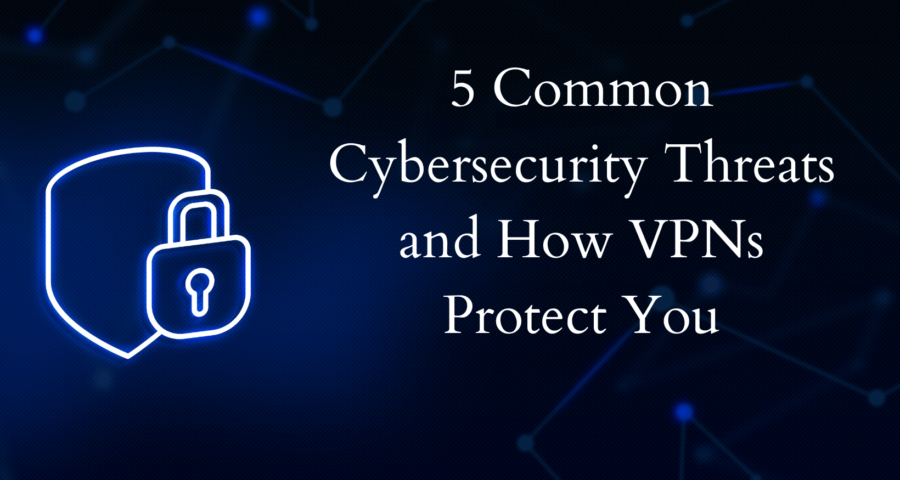In today’s digital age, cybersecurity is a paramount concern. As we rely more on the internet for communication, shopping, and work, the risks of cyber threats continue to grow. Fortunately, Virtual Private Networks (VPNs) have emerged as powerful tools to safeguard our online activities. In this blog post, we’ll explore five common cybersecurity threats and how VPNs can protect you.
5 Common Cybersecurity Threats
Threat 1: Data Breaches
Data breaches are becoming increasingly common, and they can have severe consequences for individuals and businesses alike. These breaches occur when unauthorized individuals gain access to sensitive data, such as personal information, credit card details, or login credentials.
How VPNs Protect You from Data Breaches
- Encryption: VPNs use strong encryption to secure your internet connection. When your data is encrypted, even if a cybercriminal intercepts it, they won’t be able to decipher the information without the encryption key.
- Secure Connection: VPNs create a secure tunnel between your device and the server, making it difficult for hackers to breach your connection and access your data.
Threat 2: Phishing Attacks
Phishing attacks involve tricking individuals into revealing sensitive information by posing as legitimate entities. Cybercriminals often use email or fake websites to deceive victims into disclosing personal details.
How VPNs Protect You from Phishing Attacks
- IP Masking: VPNs hide your real IP address and location, making it more challenging for cybercriminals to target you.
- Content Filtering: Some VPNs have built-in filters to block known phishing websites, protecting you from potential threats.
Threat 3: Malware Infections
Malware, short for malicious software, encompasses viruses, ransomware, spyware, and other harmful programs. Malware can infect your device when you download files, click on malicious links, or visit compromised websites.
How VPNs Protect You from Malware Infections
- Server-Based Scanning: Some VPNs offer server-based malware scanning, preventing you from accessing infected websites.
- Safe Browsing: By masking your IP and encrypting your data, VPNs reduce the risk of downloading malware from suspicious sources.
Threat 4: Man-in-the-Middle Attacks
Man-in-the-Middle (MITM) attacks involve intercepting data exchanged between two parties without their knowledge. This breach can occur on public Wi-Fi networks or compromised routers.
How VPNs Protect You from MITM Attacks
- Encryption: VPNs use encryption to make it nearly impossible for cybercriminals to intercept and read the data being transmitted.
- Secure Tunnels: VPNs create a secure path for your data to travel, reducing the risk of interception on public Wi-Fi networks.
Threat 5: Public Wi-Fi Risks
Public Wi-Fi networks, while convenient, are notorious for their security vulnerabilities. Cybercriminals often exploit these networks to steal data from unsuspecting users.
How VPNs Protect You on Public Wi-Fi
- Secure Connection: When connected to a public Wi-Fi network, VPNs encrypt your data, making it unreadable to anyone attempting to intercept it.
- Anonymity: VPNs hide your identity and location, reducing the likelihood of being targeted for cyberattacks.
What is a VPN?
A Virtual Private Network (VPN) is a service that routes your internet traffic through a secure server, encrypting your data and masking your IP address. VPNs come in various forms, including free and paid services, and can be used on individual devices or on your router to secure your entire network.
Encryption and Data Security
One of the core features of VPNs is their ability to encrypt your data, adding an extra layer of security to your online activities. Strong encryption protocols make it extremely challenging for cybercriminals to breach your connection, protecting you from various threats, including data breaches and malware infections.
Anonymity and IP Masking
By using a VPN, you can browse the web without revealing your real IP address and location. Instead, your connection is associated with the VPN server’s IP, preserving your anonymity. This feature makes it difficult for malicious actors to target you and collect sensitive information.
Protection on Public Wi-Fi
VPNs are especially valuable when using public Wi-Fi networks, which are often prime targets for cyberattacks. Whether you’re at a coffee shop, airport, or hotel, a VPN secures your connection, ensuring that your data remains confidential and safe from potential breaches.
Phishing and Malware Prevention
Many VPNs offer features like content filtering, blocking access to known phishing websites and preventing you from downloading malware. By avoiding these threats, VPNs add an additional layer of security to your online experience.
Conclusion to CyberSecurity Threats
In a world where cybersecurity threats are a constant concern, VPNs are powerful tools for safeguarding your online activities. They provide encryption, anonymity, and protection on public Wi-Fi networks. By using a VPN, you can mitigate the risks associated with data breaches, phishing attacks, malware infections, man-in-the-middle attacks, and public Wi-Fi vulnerabilities. Taking proactive steps to protect your online security is essential in today’s digital landscape.
Additional Resources and Recommendations
To get started with a VPN, consider our reputable VPN Digital Dart. Remember to choose a VPN that suits your needs and offers strong encryption and a no-logs policy for maximum security. Regularly update your cybersecurity knowledge and stay informed about best practices to keep your online activities safe and secure.


Leave a Reply